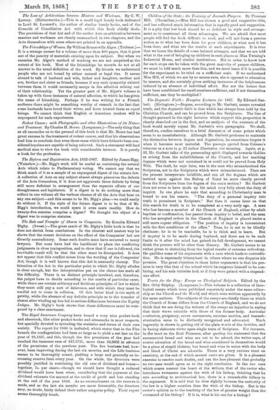The Dogmatic Faith : Hampton Lectures for 1867. By Edward
Gar- bett. (Rivingtons.)—Dogma, according to Mr. Garbett, means revealed truth, and the dogmatic faith is that which has always been held by the Christian Church. and can be proved from the Scriptures. The line of thought pursued in the eight lectures which support this proposition is clearly sketched out in the first, and an analysis of the contents of the book would merely repeat Mr. Garbett's own paragraphs. We shall, therefore, confine ourselves to a brief discussion of some points which seem to us unsatisfactory. Although Mr. Garbett professes to maintain the distinction between dogma and dogmatism, he sometimes forgets it when it becomes most material. The passage quoted from Colenso's sermons as a note to p. 22 rather illustrates our meaning. Again, at p. 32, Mr. Garbett talks of the persecuting spirit displayed towards Galileo as arising from the unfaithfulness of the Church, and her teaching dogmas which were not contained in or could not be proved from Holy Writ. The fault, he says later, was in the men who misunderstood the Scriptures, not in the Scriptures which were misunderstood. Then are the present interpreters infallible, and can all the dogmas which are insisted upon against the Bishop of Natal be more clearly proved from the Scriptures than the dogma of the sun's motion ? Mr. Garbett does not seem to have made up his mind very fully about the duty of inquiry. In one place he says that according to Christianity man is bound to use his reason. "The duty of a personal inquiry into troth is prominent in Scripture." But then it seems later on that this search for truth is to be completed at a very early age. A man who has become a member of the Church of England, either by adult baptism or confirmation, has passed from inquiry to belief, and the man who has accepted orders in the Church of England is placed under a still more cogent obligation. " The position of inquiry is inconsistent with the first conditions of the office." True, be is not to be blindly obstinate ; he is to be teachable, he is to think and to learn. But if inquiry is to be made during boyhood, and there are to be such limits to it after the mind has gained its full development, we cannot think the process will be other than illusory. Mr. Garbett seems to us rather given to shrinking from the logical results of extreme orthodoxy. He qualifies some of his arguments with a care which leads to contradic- tion. He is supremely triumphant in others where no one disputes his premiss. The great objection to these latter arguments is that his pre- miss is very like that of the school which he supposes himself to bo con- futing, and his safe victories look as if they were gained with a stupend- ous effort.


































 Previous page
Previous page